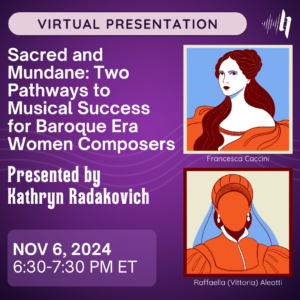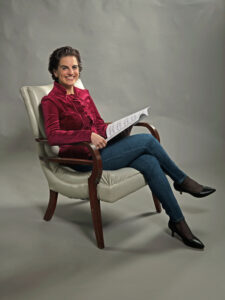Hello intrepid Women’s Philharmonic Advocacy Readers!
In honor of the US Election Day 2024, we have a shortened news brief for you featuring Stacy Garrop’s 2020 work The Battle of the Ballot. On this most important of American civic days (and the days leading up to it) please remember to get out and vote if you have not already!
First, mark your calendars! On November 6th, Kathryn Radakovich will give a virtual presentation featuring works by Baroque women composers Rafaella (Victoria) Alleotti and Francesca Caccini and acknowledging their trailblazing efforts to be composers in a era where women had limited paths that lead to that role. Radakovich is the Boulanger Initiative’s director of Learning and Engagement, and she will discuss the lives and circumstances of women in the Baroque era in addition to the works of these two women. The presentation will stream at 6:30 PM Eastern Time on November 6, 2024.
The Battle of the Ballot, Stacy Garrop 2020
In 2020 the United States celebrated the centenary of the ratification of the 19th amendment, which ensured that “The right of citizens of the United States to vote shall not be denied or abridged by the United States or by any State on account of sex,” giving all American women citizens the right to vote. Many composers took the milestone as an opportunity to commemorate the centennial in music, including: Kimberly Archer‘s Give the Ballot to the Mothers, Grace Baugher‘s Remembering the Remarkables, Stephanie Berg‘s Voices of Eve, Kathryn Bostic‘s Portrait of a Peaceful Warrior, Valerie Coleman‘s Let Woman Choose Her Sphere, Stacy Garrop‘s Battle for the Ballot, and Makenzi Johnson‘s Shine On. Garrop’s The Battle of the Ballot seems particularly fitting to feature this week as Americans head to the polls for a presidential election, both in its original orchestral version (2020) and its transcription for wind ensemble (2022).
The work was originally premiered by the Cabrillo Festival Orchestra, recorded in their homes around the world during the early days of the COVID-19 pandemic. The original premiere project was a feat of recording and mixing inspiration: the musicians each received detailed instructions about how to go about making recordings that would all eventually synchronize and a synthesized mock-up of the entire piece to give some perspective of what’s going on around them. This was to simulate what would have been done in an in-person rehearsal. Musicians then had to submit their two best audio and video recordings, and each had to be done as a complete, uninterrupted take. (Easier said than done!) “He [Svet Stoyanov, percussionist and sound engineer] put together an amazing click track,” described principal trombonist Ava Ordman. “I’ve done a few of these virtual gatherings since the pandemic started, but they’ve all been pretty rhythmically straightforward. This piece is definitely more intricate, with tempo changes or passages that have to slow down or speed up momentarily.” The recordings produced roughly 200 gigabytes of raw data, which were then synchronized and edited together to create the virtual premiere.
The texts of the piece are all quotes drawn from speeches and writings of well-known American Suffragists, including: Jane Addams, Susan B. Anthony, Carrie Chapman Catt, Carrie W. Clifford, Frances Ellen Watkins Harper, Adella Hunt Logan, and Mary Church Terrell. Garrop has blogged extensively about her process of choosing these texts, and how it was important to her to feature both Black (Carrie W. Clifford, Frances Ellen Watkins Harper, Adella Hunt Logan, and Mary Church Terrell) and White (Jane Addams, Susan B. Anthony, and Carrie Chapman Catt) activists for this cause and to interleave their voices. It expresses both the common goal they had and the obstacles facing that goal; as a result of systemic racism black women in the suffrage movement were not treated as equals with their white peers, and often formed suffrage organizations of their own when they found they were not welcome in primarily-white ones.
The composer writes in her program note that “The aftermath of the 2020 presidential election brought a fresh wave of attacks on voting rights in states all around the country. Not only is democracy a messy process, but it is something we must be vigilant in safekeeping for all of our citizens.”
Below is the recording of the 2020 premiere of The Battle for the Ballot:
Let us know what you’re listening to! Email us at info@wophil.org


